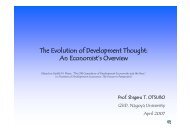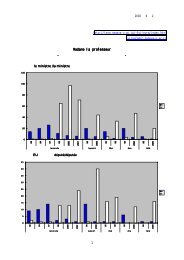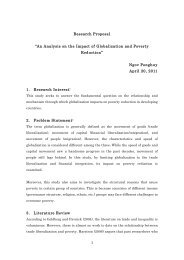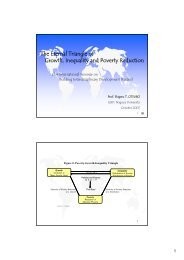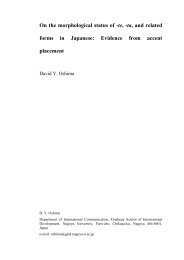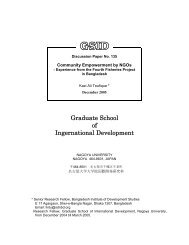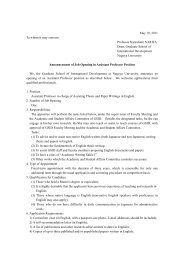Report
Report
Report
You also want an ePaper? Increase the reach of your titles
YUMPU automatically turns print PDFs into web optimized ePapers that Google loves.
180 QUANTIFICATION OF BENEFITS FROM ECONOMIC COOPERATION IN SOUTH ASIA<br />
transfer and improved management leading to lower<br />
prices and better services. When FDI (Foreign Direct<br />
Investment) was first allowed in this sector, it helped<br />
domestic players in two ways. Firstly, operators were<br />
able to share risks. Getting equity from abroad was an<br />
attractive source of capital for domestic players in the<br />
early stages since it was costless form of finance until<br />
profits were made. Secondly, domestic operators<br />
imported most of the equipments from abroad and<br />
foreign equity was able to finance it. Easing entry<br />
restrictions and increasing the threshold for foreign<br />
equity further will enable new investments especially<br />
in Bangladesh and Pakistan, two countries with large<br />
populations and enormous unmet demand.<br />
The popularity of prepaid mobile, in SAFTA<br />
countries accounting for as much as 70% of customers,<br />
has lowered barriers to telecom use by the financially<br />
constrained. But wireless is not the only thing that<br />
matters. The technological and business innovations<br />
that make possible the current levels of participation<br />
and that will enable millions more to participate are<br />
not new. Consumer-driven content and further<br />
refinement in business models focussed on mobile<br />
broadband plans are tipped to be the likely winners in<br />
coming years. Other key developments expected in the<br />
future include the further progress towards next<br />
generation networks (NGN), moving infrastructure to<br />
an IP packet-based, full service typology. In addition,<br />
many of the major players having consolidated<br />
businesses to strengthen their positions in the face of<br />
increased competition will begin to launch additional<br />
services (such as Vodafone with broadband),<br />
capitalising on growth areas in other sectors and further<br />
contributing to the convergence of technologies.<br />
Increased cooperation among SAFTA economies in this<br />
sector will perhaps catalyse this process.<br />
What has held back their deployment has been the<br />
lack of investment; what has held back investment for<br />
the most part has been the unsatisfactory policy and<br />
regulatory environment (Samarajiva 2007). Poor policy<br />
and regulatory environments drive up the costs of<br />
supplying telecom services by increasing regulatory risk.<br />
An uncertain and discretionary policy and regulatory<br />
environment constrains investment. In all countries of<br />
SAFTA, the regulator responds to political economy<br />
pressures. In India TRAIs powers have been restricted<br />
by the government and has been hard pressed to try<br />
and establish its independence. PTA has been recently<br />
created and needs to ensure that lessons from India are<br />
truly incorporated into the institutional design.<br />
CONCLUSION<br />
Benefits of the telecommunications sector are no longer<br />
thought to be confined to the sector itself. The role of<br />
telecommunications as essential to the facilitation of<br />
international trade, economic development, and the<br />
enrichment of citizens’ lives has become widely accepted<br />
(WTO 1998). Many emerging economy governments<br />
which joined in making GATS commitments on basic<br />
telecommunications had come to view inadequate<br />
telecommunications networks and services as an<br />
impediment to achieving their full economic potential.<br />
The framework developed by GATS, under the WTO<br />
regime, has caused basic changes in the market structure<br />
of telecommunications sector across the world.<br />
The paper has shown significant gap between<br />
commitments made by countries under GATS and the<br />
applicable regime. By not binding the existing regime,<br />
countries retain discretionary power to ‘backslide’<br />
which is not a good signal for increased investment.<br />
Countries should consider improving the commitments<br />
under GATS because such an action will improve the<br />
regulatory environment of the telecom sector and create<br />
the conditions for foreign investment on favourable<br />
terms. The decision should be taken because<br />
governments believe it to be in the interests of the people<br />
of SAFTA and not due to any external compulsion.




